Embracing a green lifestyle starts right in your own backyard. I’ve got some backyard sustainable living tips that’ll transform your outdoor space into an eco-friendly retreat. It’s all about making simple, smart choices that benefit both you and the planet.
From repurposing old furniture to choosing renewable resources, I’ll guide you through easy-to-implement strategies. Get ready to cultivate a slice of sustainable paradise that you’ll never want to leave. Let’s dig into creating a more self-sufficient, eco-conscious backyard together.
Benefits of Backyard Sustainable Living
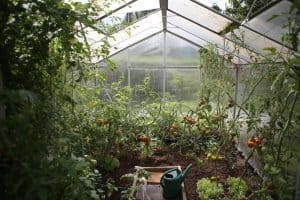
Embracing backyard sustainable living isn’t just about making eco-friendly choices; it’s about transitioning into sustainable lifestyle practices that can have a substantial impact on both the environment and personal well-being. I’ve discovered numerous benefits since I started on this journey, and I’m excited to share how transforming your outdoor space can lead to significant advantages.
Economic Perks
When I integrated backyard sustainable living tips into my life, the financial savings were immediately apparent. By implementing rainwater harvesting systems and composting bins, I slashed my monthly expenditures. Rain barrels cut down on my water usage drastically, as I could now collect rainwater to water plants and maintain my garden, saving on water bills. The compost pile provided free fertilizer, negating the need to purchase costly organic fertilizer.
Environmental Impact
The decision to live an eco-conscious backyard lifestyle means I’m reducing my carbon footprint significantly. By choosing sustainable materials for outdoor furniture and opting for native plants that require less water and care, I’m helping to conserve precious resources. Organic gardening practices, free from harmful chemicals, not only keep my family healthier but also protect local wildlife and reduce the environmental impact of my gardening.
Creating a Self-Sufficient Oasis
The thrill of cultivating my edible garden where I grow my own food is unmatched. It’s incredibly rewarding to create meals using fresh produce plucked right from my backyard. Moreover, using grass clippings and organic mulch has improved soil health, making my vegetable gardens more productive and reducing food waste. This move towards self-sufficiency has made my sustainable backyard not just a leisure spot but a vital part of my eco friendly lifestyle.
Enhancing Biodiversity
When I focused on green backyard living tips by planting a variety of flora, I began to notice a richer biodiversity around me. My yard became a habitat for beneficial insects and birds, helping to pollinate my plants and keep pest populations in check. The use of natural materials and maintaining a compost pile have attracted a diverse range of wildlife, turning my outdoor space into a thriving eco friendly oasis.
Improving Health and Wellbeing
Living a sustainable lifestyle extends beyond environmental concerns; it encompasses my health too. Taking the time to nurture a green and biodiverse backyard not only benefits the environment but also plays a crucial role in improving my overall health and wellbeing. As I immersed myself in creating a sustainable haven, I found that spending time outdoors, surrounded by nature, had a positive impact on my physical and mental health. The fresh air, the vibrant colors of the plants, and the soothing sounds of chirping birds created a natural sanctuary.
Engaging in activities like gardening became a therapeutic escape from the hustle and bustle of daily life, contributing to reduced stress levels and enhanced mental clarity. It’s fascinating how a commitment to environmental sustainability can seamlessly intertwine with personal well-being, creating a harmonious balance in both aspects of life.
Choosing the Right Plants for a Sustainable Backyard
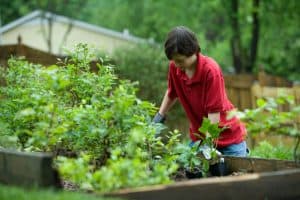
Eco-conscious backyard living starts where you might not expect – with the plants that populate your outdoor space. The right greenery isn’t just décor; it shapes your home’s environmental impact and contributes to a sustainable lifestyle. So, let’s dig into the world of plants and see how they can enhance our backyards while keeping eco-friendly living in mind.
Sustainable Lifestyle Practices Start with Native Plants
When it’s time to select flora for my backyard, I always lean towards native plants. Here’s why they’re a top pick:
- Reduced Water Usage: Native species are adapted to local rainfall patterns and climate conditions, meaning they often require less watering than exotic plants.
- Lower Maintenance: These plants have developed natural resistance to local pests and diseases, which translates to less need for harmful chemicals.
- Attract Beneficial Wildlife: Native flora are the perfect hosts for local bees, butterflies, and birds, increasing biodiversity.
Incorporating an edible garden offers fresh produce and cuts down on your carbon footprint. I use a variety of vegetables and herbs that thrive in my climate, creating a bountiful supply that goes straight from my soil to my table. Plus, growing my own food fosters a deeper connection to what I eat and reduces food waste.
Green Backyard Living Tips: Nourish the Soil Naturally
An eco-friendly oasis thrives with rich soil, and one of the easiest ways to ensure soil health is through composting. Anything from grass clippings to food scraps can go into the compost bin, turning would-be waste into free, organic fertilizer. Here’s how I make the most of it:
- Utilize a compost pile or bin to breakdown organic waste.
- Spread finished compost to nourish plants and improve soil structure.
- Use compost as a natural pest deterrent, reducing the dependency on chemical options.
When it comes to mulching, I choose organic mulch, like wood chips or pine needles, which break down over time to enrich the soil, conserve water, and smother weeds. This natural alternative to synthetic materials keeps the garden looking pristine without compromising my commitment to sustainable living.
Using Renewable Resources in Your Backyard
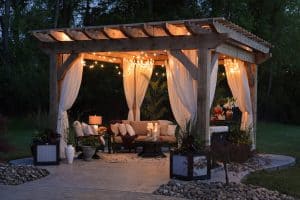
Embracing renewable resources is at the heart of eco-conscious backyard living. By integrating sustainable lifestyle practices into my yard, I’ve discovered not only environmental benefits but cost savings as well. In delving into green backyard living tips, I’ve honed strategies that others can replicate for an eco-friendly oasis.
Solar Energy: Harnessing the Sun’s Power
Solar panels have been a game-changer for my outdoor space. I’ve used them to power everything from garden lights to water features. Solar energy reduces reliance on the grid, and in turn, shrinks my carbon footprint. It’s a clean power source that helps me save on electricity bills while making my space more self-sufficient. Transitioning to LED lighting has bolstered this effort by ensuring the most efficient use of the solar power I collect.
Water Conservation Tactics
Conserving water is a critical aspect of sustainable backyard management. Installing a rainwater harvesting system allows me to collect rainwater for irrigation. By using rain barrels, I store water during times of abundance and use it during dry spells, which conserves water and reduces my water bill significantly. Additionally, when I water plants, I’m careful to do it during cooler parts of the day to minimize evaporation and make every drop count. Following these simple eco-friendly practices helps to safeguard the local water supply while maintaining a beautiful lawn and garden.
Organic Waste Recycling: Composting
I’ve learned that compost bins are indispensable for sustainable living in my backyard. I start composting with kitchen food scraps and grass clippings which become free fertilizer for my plants. Using organic mulch made from recycled paper, wood chips, or pine needles builds soil health and adds nutrients without harmful chemicals.
Repurposing and Upcycling in Your Outdoor Space
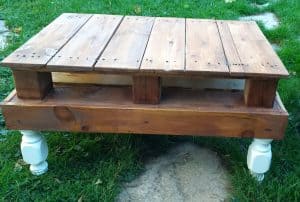
Transforming your backyard into an eco-friendly oasis isn’t just about planting flowers and growing vegetables; it’s also about embracing a sustainable lifestyle that promotes a healthier environment and helps you save money. One of the most fulfilling approaches to achieve this is through repurposing and upcycling.
Bring New Life to Old Items
Whenever I look at what others might consider ‘junk,’ I see potential. That broken chair lying in the corner? It’s a new plant holder for my edible garden. Those wooden pallets discarded by the local warehouse? They’re the perfect sustainable materials for a new DIY patio table. Repurposing items not only reduces waste but also adds personality and charm to my outdoor space.
Choose Sustainable Materials
When it’s time to add or replace features in my backyard, I go for eco-friendly materials. Bamboo and recycled wood are excellent choices for decking as they are durable and have a low environmental impact. For decor, I’ve found that antique patio furniture from thrift stores not only adds character but also prevents another item from ending up in a landfill.
DIY Eco-Conscious Solutions
Creating a green backyard living space often involves simple DIY projects that have a big impact. One project I’ve found particularly rewarding is building a rain barrel system. Rainwater harvesting systems are a great way to conserve water that would otherwise be lost. The water collected can be used to water plants, which in turn, minimizes my overall water usage.
Embracing Organic Gardening
In my journey to lead a more sustainable lifestyle, implementing organic gardening practices was a game-changer. By starting a compost bin, I give my food scraps and grass clippings a second life as free fertilizer. This not only nourishes my plants without harmful chemicals but also dramatically reduces my carbon footprint.
Attracting Beneficial Wildlife
Using native plants in my landscaping serves a dual purpose. Besides being low-maintenance and requiring less water, they also help to attract bees and other pollinators. Establishing a habitat that supports wildlife contributes to a balanced ecosystem right in my own backyard.
Rainwater Harvesting for a Sustainable Garden
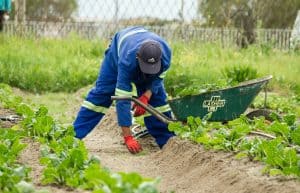
As a seasoned gardener committed to Eco-Conscious Backyard Living, I’ve come to appreciate the art of Rainwater Harvesting. It’s such a game-changer for maintaining a lush garden while aligning with Sustainable Lifestyle Practices. Let’s dive into how this method can be seamlessly integrated into your daily gardening routine to foster an eco-friendly backyard.
Save Money While Saving the Planet
Installing a Rainwater Harvesting System isn’t just great for the environment; it’ll save you a pretty penny too. By collecting rainwater, you’re reducing your Water Usage, particularly during dry spells when your garden thirsts for more. A Rain Barrel set-up is user-friendly, cost-efficient, and an excellent step toward a Sustainable Backyard. With water bills on the rise, using harvested rainwater to Water Plants and maintain your Beautiful Lawn is a wallet-friendly solution.
From Rain to Growth: The Water Cycle in Your Backyard
Collecting rain is simple when using the array of Eco-Friendly Materials available for rain catchment systems. Whether you choose repurposed barrels or specially designed Rain Barrels, make sure they’re made of materials that won’t leach Harmful Chemicals into your collected water. I’ve discovered that Natural Materials like wood or clay are superb options as they’ll ensure the water stays uncontaminated – pure gold for an Organic Garden.
Beyond Watering: The Multipurpose Nature of Harvested Rain
We’re not just talking about quenching the thirst of your Vegetable Gardens and Plant Flowers. Harvested rainwater is soft water, free of minerals, and therefore ideal for many household uses. From Pool Maintenance to washing your car – you’ll reduce your Carbon Footprint significantly. Moreover, it acts as Free Fertilizer since rain picks up nitrogen from the air, providing nutrients for your plants.
Final Thoughts: Backyard Sustainable Living Tips
Adopting sustainable living practices in your backyard isn’t just a trend—it’s a lifestyle change that offers immense rewards. I’ve seen firsthand how small shifts can lead to significant benefits, from slashing utility bills to fostering a profound sense of wellbeing. Whether it’s the gentle hum of a rainwater system or the simple joy of harvesting your own vegetables, the steps toward sustainability can reshape not only your garden but also your life. Let’s not forget the satisfaction of knowing you’re contributing to a healthier planet. So here’s to making every corner of our outdoor space a testament to eco-conscious living—your backyard utopia awaits!


